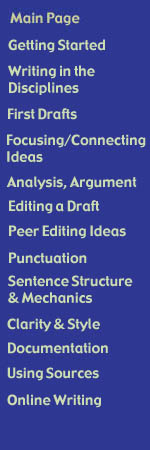

Basics of Electronic Writing
by Joe Essid, Writing Center Director
(printable version here)
E-Mail: Politeness and Format
- Sign your e-mail or use a signature file. Never leave the audience guessing who you are.
- When writing to individuals you do not know well or who are superiors, NEVER forget the salutation with title (Dear Dr. Smith, Dr. Ms. Jones). Leaving these out makes a writer seem rude.
- Never leave a subject line blank. I delete such messages, unread. Always use subject lines that are specific, rather than general; I also delete, unread, most messages with the subject "help!" or "question." When you reply to a message, change the subject line if the subject of the message changes.
- Ask permission before quoting anyone on-line or forwarding e-mail from one person to another.
- By the same token, remember that your words have a secondary audience--anyone to whom the message could be forwarded. Beware saying overly critical things if you think the message might be forwarded to a third party. Such e-mail may come back to haunt you!
- Sadly, you cannot protect yourself if someone alters your mail and then forwards it. It is best to entrust the most sensitive matters to paper--it is harder to forge!
- Use gender-inclusive language in all writing. You can usually avoid "he, she, his, and her" by making nouns and pronouns plural.
- AVOID TYPING IN ALL CAPS. Do you want to shout on-line? *Emphasis with asterisks* provides a better alternative.
- Use punctuation and both lower and capital letters. Writing without these features tends, for academic audiences, to make the writer look hurried, even less intelligent. E-mail is not the same as instant messaging. Some professionals will return, with a snide remark, e-mails written without capitalization and punctuation to their authors.
E-mail: Mailing-List Concerns
- When replying to a message from a mailing list, double-check the "To:" line. Did you send it back to the original sender, or to the entire list? Sending a private message to a list can be very, very embarrassing.
- Be very careful with the "reply all" feature of some mail programs! You can end up sending a reply to everyone who was sent a carbon-copy of the sender's message to you.
- Never, never, never send or re-send chain letters. You can lose your computing account for this. Chain letters needlessly tie up computer resources (the headers on the letter get very long after a few replies).
Netiquette--Avoiding "Flames"
- The term "flame" comes from the world of Unix computing, and it is as old as e-mail itself. It has come to refer to personal attacks sent to lists, newsgroups, or individuals.
- Do not write anything that you would not want posted on a bulletin board.
- Count to ten when you are angry about something written to you. Then count to ten again before you begin a reply.
- Never send a reply to someone until you have read it carefully and considered the impact on your audience.
- If another person flames you, don't fire back with more invective unless you are ready for a war of escalation. Like bullies, flamers tend to go away if ignored.
- If friends write something offensive and send it to you, ask them why. The tone of the message in e-mail can get distorted. What sounds fine in speech, such as "I need some help with this!" can sound abrupt, even rude, in a mail message.
E-mail Netiquette--Avoiding "Spam"
- Junk e-mail sent to many lists is called "spam." Broadly speaking, overly long messages, and those sent to people who really don't need to read them, are known as spam.
- Do not overuse the "priority" and "high priority" tags permitted by some e-mail software. Remember the story of the boy who cried wolf? If every message you send is marked "priority," pretty soon all of your messages will be ignored.
- Most regular users of e-mail get dozens of messages each day. Some get hundreds. Keep your messages short and to-the-point unless a long message is appropriate.
- Long e-mail messages are acceptable when sent to an individual you know well. On the other hand, long messages may be ignored when you send them to multiple recipients, or to a mailing list.
- Try to limit your messages to one topic. Asking about many things in the same message annoys most veteran e-mailers.
Back to 'Writing Online'
Writer's Web | Writing Center | Make
an Appointment | Library
Copyright Info